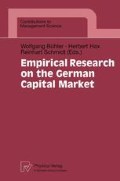Abstract
The German futures market “Deutsche Terminbörse” started trading in DAX futures contracts on November 23, 1990. The foundation of these futures contracts, the DAX1, is based on the prices of 30 German Blue Chips. The standardised delivery months are March, June, September, December. The German Options and Futures Exchange simultaneously lists three subsequent delivery dates. The final cash settlement takes place on the third Friday of the delivery month.
Access this chapter
Tax calculation will be finalised at checkout
Purchases are for personal use only
Preview
Unable to display preview. Download preview PDF.
References
Bamberg, G. and Röder, K. (1993): Arbitrage am DAX-Futures Markt unter Berücksichtigung von Einkommensteuern, in: Kredit und Kapital 26, 575–607.
Bamberg, G. and Röder, K. (1994a): Arbitrage institutioneller Anleger am DAX-Futures Markt unter Berücksichtigung von Körperschaftsteuern und Dividenden, in: Zeitschrift für Betriebswirtschaft 64, 1533–1566.
Bamberg. G. and Röder, K. (1994b): The Intraday ex ante Profitability of DAX-Futures Arbitrage for institutional Investors in Germany — The Case of Early and Late Transactions, in: Financial Markets and Portfolio Management 8, 50–62.
Bamberg. G. and K. Röder (1994c): Seasonality in Ex Ante German Stock Index Futures Arbitrage — Where Do Arbitrage Profits in Germany Come from?, Arbeitspapiere zur Mathematischen Wirtschaftsforschung, No. 120, University of Augsburg.
Bröker, K. (1991): Neue DTB-Produkte, Anlage Praxis, 20–21.
Bühler, W. and Kempf, A. (1993): Der DAX-Future: Kursverhalten und Arbitragemöglichkeiten, in: Kredit und Kapital 26, 533–574.
Chung, P. (1991): A Transactions Data Test of Stock Index Futures Market Efficiency and Index Arbitrage Profitability, in: Journal of Finance 66, 1791–1809.
Cornell, B. and French, K. (1983a): The Pricing of Stock Index Futures, in: Journal of Futures Markets 3, 1–14.
Cornell, B. and French, K. (1983b): Taxes and the Pricing of Treasury Bill Futures Contracts, in: Journal of Finance 38, 675–694.
Deutscher Kassenverein AG (1992): Technische Richtlinien für Leihgeschäfte — Banken. Frankfurt, 1992.
Grünbichler, A. and T. Callahan (1993): Stock Index Futures Arbitrage in Germany: The Behavior of the DAX Index Futures Prices, Working Paper, University of California, Los Angeles.
Hoffinann, P. and R. Ramke (1990): Finanzinnovationen an der Deutschen Terminbörse (DTB): Chancen und Risiken des Handels mit Optionen und Fmanzterminkontrakten, Grundlagen und Praxis des Bank-und Börsenwesens, No. 23. Berlin (Erich Schmidt).
Hohmann, R. (1991): Der Einfluß der Wertpapierleihe auf die Bewertung des DAX-Futures, in: Kapitalanlagen Wirtschaft Recht Steuern 4, 574–582.
Janßen, B. and B. Rudolph (1992): Der Deutsche Aktienindex DAX, Konstruktion und Anwendungsmöglichkeiten. Frankfurt (Frankfurt Stock Exchange).
Jung, J. and Redanz, U. (1993): Zur Besteuerung der DTB-Geschäfte von Privatanlegern im Gewerbebetrieb und in der privaten Vermögensverwaltung, in: Zeitschrift für Bankrecht und Bankwirtschaft, 68–89.
Kawaller, I. (1987): A Note: Debunking the Myth of the Risk-Free Return, in: Journal of Futures Markets 7, 327–331.
Loistl, O. and M. Kobinger (1992): Index-Arbitrage insbesondere mit DAX-Futures, Beiträge zur Wertpapieranalyse (der DVFA), No.28.
Modest, D. and Sundaresan, M. (1983): The Relationship between Spot and Futures Prices in Stock Index Futures Markets: Some Preliminary Evidence, in: Journal of Futures Markets 3, 15–41.
Prigge, J. and Schlag, C. (1992): Die Bewertung des DAX-Future-Kontrakts an der Deutschen Terminbörse, in: Zeitschrift für Bankrecht und Bankwirtschaft, 299–307.
Author information
Authors and Affiliations
Editor information
Editors and Affiliations
Rights and permissions
Copyright information
© 1999 Springer-Verlag Berlin Heidelberg
About this paper
Cite this paper
Röder, K., Bamberg, G. (1999). The DAX Futures Market and Dividends. In: Bühler, W., Hax, H., Schmidt, R. (eds) Empirical Research on the German Capital Market. Contributions to Management Science. Physica, Heidelberg. https://doi.org/10.1007/978-3-642-58664-4_14
Download citation
DOI: https://doi.org/10.1007/978-3-642-58664-4_14
Publisher Name: Physica, Heidelberg
Print ISBN: 978-3-7908-1193-3
Online ISBN: 978-3-642-58664-4
eBook Packages: Springer Book Archive

